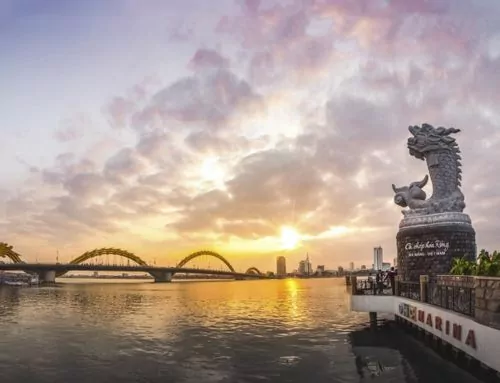This article provides essential tips on how to pay for goods in Vietnam when traveling around the country.
One of the most important things on every traveler’s mind is money at the destination. Where to get it, how much to keep, how to exchange it, or how to pay for everything are all questions that one must think and inquire about before visiting a foreign country. In Vietnam, and generally in the rest of Asia, cash is king, but it’s a complicated matter! Before going to Vietnam, please take a few minutes to read through this information so that your trip to Vietnam will be hassle-free!
Here’s what we’ll show you:
How to spend your money in Vietnamese Dong?


500,000 VND = 20 USD (Oct 2022)


200,000 VND = 8.05 USD (Oct 2022)


100,000 VND = 4 USD


50,000 VND = 2 USD


20,000 VND = 0.8 USD


10,000 VND = 0.4 USD
Vietnam offers many opportunities to spend money, whether it’s shopping, traveling or delicious food! You can pay in Vietnam Dong (VND), US dollars or by credit card. Spending in VND is often the best way to ensure that you get the best price. Be careful with the bills – although all denominations come in different sizes and colors, it’s still hard to tell them apart. For example, the VND 500,000 and VND 20,000 bills have a slightly different color blue, while the 200,000 and 50,000 bills are red. It is perfectly reasonable to confuse one with the other. At local markets or shops, make sure you bring small bills (under 100,000) as they may not have change for you. Many places also accept USD but you usually won’t get a very good rate as the seller can set their own term.

Some major stores, hotels and restaurants can accept credit cards but most do not! Make sure you check first. First, any establishment that allows purchases by credit card will usually only accept Visa and MasterCard cards. You may have some trouble finding places that accept American Express, Diners International, or credit cards from other credit card companies. You will most likely be charged a 2-3% transaction fee for purchases made with a credit card. Additionally, you may be charged an international transaction fee through your bank or credit card company, usually 3-5% of the purchase price. If you are a travel enthusiast, it will save you a lot of money if you get your hands on one of these no-charge international cards. The best ones are the Discover It Card, the Capital One Venture Rewards Card, the Chase Sapphire Preferred, or the American Express Platinum Card.

In many cases, paying with a credit card may not be an available option or may not be cost-effective, but paying with a credit card has certain benefits. The first is that Visa and MasterCard give you the best exchange rate of the week. The exchange rate they give you will be better than the rate you get when exchanging cash at the bank. Another important consideration when paying for things by credit card is that there is often inherent insurance provided by your charge card issuer (Visa/MasterCard) or your credit card issuer. For bulk items like hotels or flights, you can use your credit card, just in case there’s a discrepancy or an emergency. Depending on your coverage, you can claim or dispute everything if you pay by credit card – hotel theft, fraudulent transactions, jewelry insurance, etc. However, be very mindful of transaction fees and associated costs, as the cost of using your credit card in Vietnam may not be justified.
How to exchange money to Vietnamese Dong?

If you bring some foreign currency cash, you can change it to VND at banks or foreign exchange offices. You may get a slightly better rate of return at the banks but you will always lose a bit on the exchange. The disadvantage of going to the bank to change money is that you need to show your passport for identification and you need to fill out a form first. It can be a hassle when you want to make a quick exchange and then go. In addition, at currency exchange booths, you can exchange money instantly. For USD and CAD, exchange in $100 to get the best exchange rate. Money changers around tourist attractions like Ben Thanh market can charge higher transaction fees, so it’s best to avoid them unless you’re in a hurry. Please also note that many money changers will not accept old or torn bills. Bring fresh and sharp banknotes to get the best exchange rate. If you happen to have damaged bills that no one else will accept, just go to the bank and exchange it for a new one for a small fee.
Another place to change USD to VND is at many gold shops in Vietnam. This is technically illegal, but if you lose or forget your passport, banking isn’t an option for you, so you’ll have to change money at stalls or gold shops. In the past, you would get significantly better exchange rates at stores than elsewhere, but now the exchange rates are no longer different.
How to receive Vietnamese Dong from ATM?

For extra cash, you can always go to any ATM in the city, but first you must know the rules of your bank and your debit or credit card. There are many credit and debit cards that charge very high fees for cash withdrawals abroad and can be very expensive! You will also have to find out the daily transaction limit for your card. For ATM-related fees, the withdrawal fee is usually around 20,000 VND (about 0.8 USD). Some people have reported that DongA Bank ATMs do not charge a transaction fee but in our experience there is always a nominal fee. That said, withdrawing money from a credit card will cost you a lot of money because not only will you be charged for an international cash advance, but the money will start accruing interest immediately. . We recommend withdrawing funds via debit card.
Most ATMs of HSBC and Techcombank allow maximum withdrawal of each transaction from 5 million to 6 million. Other ATMs allow about 2 million VND. For large withdrawals, the ATM will issue a 500,000 VND note that you will then have to exchange for a smaller bill for small purchases. ATMs around the city are generally safe, but as anywhere else in the world, try to avoid ATMs in convenience stores and bars.
If you need a really big amount of cash, Western Union is the best way to go. It’s less expensive and hassle-free than wire transfers and has hundreds of locations within Ho Chi Minh City alone. Depending on the amount, you may pay less Western Union transaction fees than your international bank or credit card cash advance fee. Simply ask a friend or family member to visit a Western Union branch in your home country and fill out the appropriate paperwork. Make sure that the spelling of the recipient’s name matches exactly as on the passport – even a crossed out letter is grounds for rejection. Note that the money they send you will come from their own account, not yours, unless they have a power of attorney or co-ownership of your account.
Remember that no matter what, be safe with the money you have. Avoid carrying large amounts of money and use money belts if possible!
Hope you enjoy another great travel tip brought to you by Vietnam Travel Guide.


